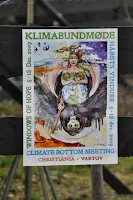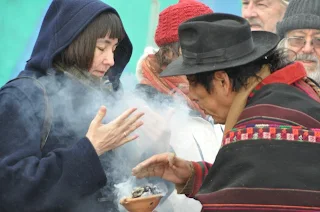My COP15 Journal: Day Two
 Day Two. After muesli and yogurt, we took the morning train with Ross Jackson to Klimabundmode, just off Pusherstrasse in Christiania. Klimabundmode is dansk for “Climate Bottom Meeting” (as opposed to the top-down meeting which will be happening across town beginning Monday). Our program is called “Windows of Hope” and began with a ceremony out around the fire that was kindled at sunrise by a Bolivian shaman. There are 50 or 60 hardy souls who gathered with us for the circle, a small number perhaps, but it represented nearly that many countries and peoples — Laplanders, Hungarians, Nepalese, Venezuelans, Aussies; scores more. Medicine Story, a familiar Wampanoag who used to live at The Farm, gave a sweet invocation and then we shifted to the Big Top for the first day’s circus.
Day Two. After muesli and yogurt, we took the morning train with Ross Jackson to Klimabundmode, just off Pusherstrasse in Christiania. Klimabundmode is dansk for “Climate Bottom Meeting” (as opposed to the top-down meeting which will be happening across town beginning Monday). Our program is called “Windows of Hope” and began with a ceremony out around the fire that was kindled at sunrise by a Bolivian shaman. There are 50 or 60 hardy souls who gathered with us for the circle, a small number perhaps, but it represented nearly that many countries and peoples — Laplanders, Hungarians, Nepalese, Venezuelans, Aussies; scores more. Medicine Story, a familiar Wampanoag who used to live at The Farm, gave a sweet invocation and then we shifted to the Big Top for the first day’s circus. 
After spending time in the streets and subways of Copenhagen we couldn’t help but notice how most folks’ favorite color is black. Its New York or Chicago without the ear-buds. Something about the cold and city living brings out black, we guess. That’s why it was refreshing to be back in Christiania where the colors are bleach resistant and the indigenous peoples add panache.
The two-story pellet stove for the tent was still under construction, so we huddled together and stamped our feet and cupped our hands behind steamy breath as we listened to Marti Mueller recount the road from Rio trough Kyoto and Bali to this place, and then watched various national delegates and chargé d’affairs parade to the solar and pedal-powered podium to deliver prognosis and benefactions.
 The official delegate from Greenland, Tove Sovndahl Pedersen, said that the warming of the climate represents both challenges and opportunities. For them, hydropower, agriculture and forestry are improving. Greenland potatoes are more flavorful and disease resistant. Mineral resources are more exposed and Greenland has lots of valuable ones, especially well suited for high technology.
The official delegate from Greenland, Tove Sovndahl Pedersen, said that the warming of the climate represents both challenges and opportunities. For them, hydropower, agriculture and forestry are improving. Greenland potatoes are more flavorful and disease resistant. Mineral resources are more exposed and Greenland has lots of valuable ones, especially well suited for high technology.  Sure, as sea ice melts, coastal flooding and loss of hunting areas of marine mammals and halibut are problems of survival for indigenous rural settlements. But new sea routes will open from North America and Europe to Asia, and shipping routes could be greatly reduced. While commerce may improve, it is a concern to Greenlanders because all of that new oil and toxic materials will be carried through their treacherous and vulnerable coastal waters. She wrapped up by paying homage to the God of status quo: Greenlanders know from their own eyes that weather is changing and also becoming more unstable, but we need a COP-15 agreement that allows us economic progress, and allows us to make improvements in food, and health and education of our poor. All the time she is saying this we are thinking, it is so easy to spot the elected officials here.
Sure, as sea ice melts, coastal flooding and loss of hunting areas of marine mammals and halibut are problems of survival for indigenous rural settlements. But new sea routes will open from North America and Europe to Asia, and shipping routes could be greatly reduced. While commerce may improve, it is a concern to Greenlanders because all of that new oil and toxic materials will be carried through their treacherous and vulnerable coastal waters. She wrapped up by paying homage to the God of status quo: Greenlanders know from their own eyes that weather is changing and also becoming more unstable, but we need a COP-15 agreement that allows us economic progress, and allows us to make improvements in food, and health and education of our poor. All the time she is saying this we are thinking, it is so easy to spot the elected officials here.Ross Jackson delivered a prescriptive talk, asking, what is an ideal climate treaty? He said it would have three essential elements.
- It must be a guarantee that we will hit the target;
- It must be effective; and
- It must be equitable.
The Kyoto process fails on all three of these criteria, he said.
Three proposals have been put forward by NGOs that do meet these criteria: Earth Atmospheric Trust, Kyoto 2, and (Jackson’s own) Carbon Board. There are some common threads that characterize these solutions.
- A declining cap — a CO2 limit that goes down every year;
- A tight mechanism to fairly auction the rights to pollute;
- Those who pollute less should be allowed to prevail, financially, over those who pollute more; and
- Part of the revenues generated (1-4 trillion dollars/yr by some estimates) must work towards convergence, but be distributed to individuals rather than heads of state. Jackson called this cap and trade and share. He also noted some part will be needed to fund environmental litigation (read: enforcement). Amen.
Sadly, he said, we have a broken system today. The political establishment has the same approach to debt reduction, financial crisis, and WTO negotiations as they do to climate: talk, delay, declarations of success, and then failure to follow through with commitments.
The need, he said, is for a super-national organization. Economic growth is always trotted out to defend political interests, but truth is, economic growth has become uneconomical. We are destroying the global ecosystem with over-consumption, so what economy exists without that? The important business of saving the world has to be taken out of the hands of governments and politicians that compete with each other. National sovereignty has to be sacrificed if we are to survive, he opined.
Tough sell, we thought. Wonder how many delegates at the COP venue will sign on for that.
Over tea in a Christiania coffee shop, Auroville’s pragmatic dreamer, Luigi Zanzi, said we are going through a difficult passage at this time, but it is exactly that difficulty that gives him hope. Of course, moving to a new level of consciousness will not be smooth and easy, he acknowledged. The passage between death and life, and life and death are difficult, but we do them. The passage from matter to mind was even more difficult. And here we are, imperfect human, searching for perfection in a totally integral way, and will that not be difficult?
He says: “This gives me not only hope, but certainty that we are at the job of evolution, and Mother Nature knows very well where she is taking us, through the apparent contradictions, and fear.” We have been used to building our world by external manipulations for centuries, but now we must build a subjective civilization, and that requires inner transformation as a prerequisite to environmental transformation.
Ooops, we thought. Here we go again.
Marti Mueller, across the table, piled on with Luigi, “Fear is one of the reasons we are in the crisis today. Lets throw that out the window and act out of courage. Lets save as many of our co-species as possible. We need to reach a change of consciousness. Andre Malroux said, ‘If the 21st Century is not a spiritual one, we will not survive.’”
Sarvodaya representative Vinya Ariyaratne quipped, “I am a Buddhist. Life is change.”
Finally we’d had enough, the tea was finished, and we decided to burn some bridges. “Asking for perfect enlightenment of humanity as a prerequisite to rescuing us from climate change seems a pretty high bar,” we blurted. “Why not just settle for getting the dirt right? People have to eat, right? So lets just start there, and if we get the dirt right, the climate will follow.”















Comments